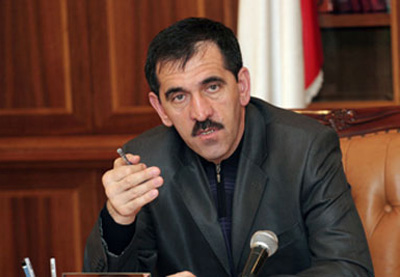
Popular Cleric Poses a Threat to Ingushetia’s Leader
Publication: Eurasia Daily Monitor Volume: 10 Issue: 142
By:

After a year of sparring with Chechen leader Ramzan Kadyrov over several dozen hectares of disputed land, the president of Ingushetia decided to distinguish himself in yet another field. According to official information, Yunus-Bek Yevkurov has been strenuously trying to purge the republican interior ministry’s ranks of personnel who may be connected to or sympathetic to Ingush rebels.
Ingush Interior Minister Alexander Trofimov, who is an ethnic Russian, noted at a recent ministry meeting that a third of all registered crimes in the republic during the first six months of 2013 were categorized as “grave” (www.regnum.ru/news/kavkaz/ingush/1687366.html). The minister also said that in the same period, 343 police officers were prosecuted for various offenses, 20 of whom were fired. For such a small republic, these figures are quite significant, and comprise nearly 10 percent of the total number of police officers in the republic (https://newsland.com/news/detail/id/551303/).
The Ingush interior minister admitted that even though there is no lack of people who would like to work for the republican police, “unfortunately, the influx of applications does not reflect the prestige of the service, but rather the high salary it fetches” (www.regnum.ru/news/kavkaz/ingush/1687366.htm). For example, a staff sergeant in Ingushetia’s police has been earning the equivalent of about $1,800 per month since 2012 (https://newsland.com/news/detail/id/793545/). That is not simply good money, but a blessing in a region where average salaries are about $300–$500 a month and the unemployment rate is nearly 50 percent (https://finmarket.ru/z/nws/news.asp?id=3412772). If a staff sergeant joins a special unit, his salary jumps to approximately $2,300 a month. Thus, it is little wonder there is no shortage of applicants for such a job, despite the great risk of being attacked by insurgents.
On July 25, Yevkurov met with Russian Interior Minister Vladimir Kolokoltsev. Yevkurov asked the minister to increase assistance with equipping police units in the republic’s villages (www.regnum.ru/news/kavkaz/ingush/1688115.html). It is highly unlikely that such a mundane issue needed to be discussed with the federal interior minister given that the republican interior minister could have dealt with it himself. Most likely, the two officials discussed increasing the number of police in the republic—something that would have a negative impact on Yevkurov’s image in the run-up to elections. Another possible topic of discussion may have been the tense relations between the Ingush and Chechen police.
The activities of the rebels in Ingushetia have markedly declined after the arrest of Ali Taziev (a.k.a. Magomed Yevloev, Emir Magas) and the killing of several other leaders of Ingushetia’s armed underground movement within the Caucasus Emirate in 2010, including Alexander Tikhomirov (a.k.a. Said Buryatsky). However, the republic is still far from being a quiet place. During the second quarter of 2013, from April to June, 39 people were victims of violence, including 11 killed and 28 wounded. Of the 11 killed, two were police officers, eight were suspected militants and one was a civilian. Of the 28 wounded, 27 were police officers and one was a suspected rebel (www.kavkaz-uzel.ru/articles/227562/). Thus, the situation in Ingushetia, a territory of only 3,500 square kilometers and one that is mostly covered by desolate mountains, remains relatively tense.
At the end of June, the Ingush interior ministry became entangled in a conflict with one of the best known Muslim leaders of Ingushetia, Imam Khamzat Chumakov. In a typical move, the police planted weapons in the car of Akraman Yevkurov, Chumakov’s driver and bodyguard, and arrested him, in order to force the imam to stop criticizing the authorities (www.kavkaz-uzel.ru/articles/227631/).
Yevkurov apparently decided to start a conflict with Chumakov, the most popular Muslim cleric in Ingushetia, in an attempt to decrease the extremist threat. The imam has preached at the Nasyr-Kort mosque in Nazran for the past several years. Chumakov enjoys considerable respect not only in Ingushetia, but also in other republics of the North Caucasus. In contrast, many people in Ingushetia do not know who their local mufti is.
In a typically ill-mannered fashion, Yevkurov summoned Chumakov to the presidential palace, where he upbraided the cleric for criticizing the republican authorities’ policies and demanded that he stop preaching at the Nasyr Kort mosque (https://wordyou.ru/v-rossii/molchanie-imama-uzhe-ne-zolooto-a-zhizn.html). In reality, the situation is not simply reducible to a conflict between the head of the republic and the imam. In a republic where there is no real opposition, Chumakov has become one of the most popular public figures (https://www.kavkaz-uzel.ru/articles/227727/). So, naturally, Yevkurov is scared of Chumakov’s popularity. Because of his substantial popularity in the republic, the Muslim cleric permits himself to criticize the authorities openly, in front of thousands of parishioners, which frightens the government (https://ansar.ru/person/2013/7/28/42624?print). “Berating the government is fashionable, while getting down to doing something useful is not prestigious,” a spokesperson for Ingushetia’s government, Irina Kuksenkova, told Kavkazsky Uzel (Caucasian Knot). The situation has reached the point where if anything happens to Chumakov it will automatically be considered an act of vengeance by Yunus-Bek Yevkurov.
Therefore, the Ingush authorities find themselves relying primarily on building up the strength of the police and gagging those few people still able to criticize the authorities, including the head of the republic. This trend is bound to result in a deterioration of the situation in Ingushetia. For the first time since Ruslan Aushev stepped down as the republic’s president in 2002 and civil activist Magomed Yevloev was killed in 2008, Ingushetia has a person who is actually respected and trusted by a majority of the population. This makes the situation in the republic quite intriguing and at the same time highly unstable.




